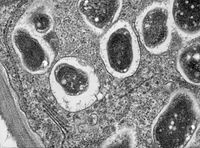
Photo from wikipedia
Abstract Many beneficial bacteria that colonize plant roots and facilitate plant growth to alleviate the stress posed by several biotic and abiotic factors through direct and indirect mechanisms are known… Click to show full abstract
Abstract Many beneficial bacteria that colonize plant roots and facilitate plant growth to alleviate the stress posed by several biotic and abiotic factors through direct and indirect mechanisms are known as plant growth promoting rhizobacteria (PGPR). These PGPRs are recognized as efficient biofertilizers, biocontrol agents and microbial inoculants. Looking at the potential benefits of PGPRs in present study efforts have been made to isolate, screen and characterize rhizobacteria from the soil samples collected from the root zone of various pulses. Out of seven strains, six strains were methyl red positive and Voges-Proskauer's test positive indicating their fermentation ability. All seven strains except AV-1 produced catalase enzyme indicating their potential as promising biocontrol agents. AV-4 and AV-7 strains were found to be phosphate solubilizers and strains AV-1, AV-2 and AV-7 were siderophore producers. Two strains AV-3 and AV-5 were heavy metal tolerant for Arsenic (29.48 mg/l), Barium (12.56 mg/l) and Nickel (5.926 mg/l). Looking at the various traits of all the rhizobacterial isolates AV-7 can be considered as a potential biofertilizer to support the growth and production of the legumes in the soil which is not polluted with As, Ba and Ni. This will help in supporting sustainable pulse production.
Journal Title: Biocatalysis and agricultural biotechnology
Year Published: 2020
Link to full text (if available)
Share on Social Media: Sign Up to like & get
recommendations!